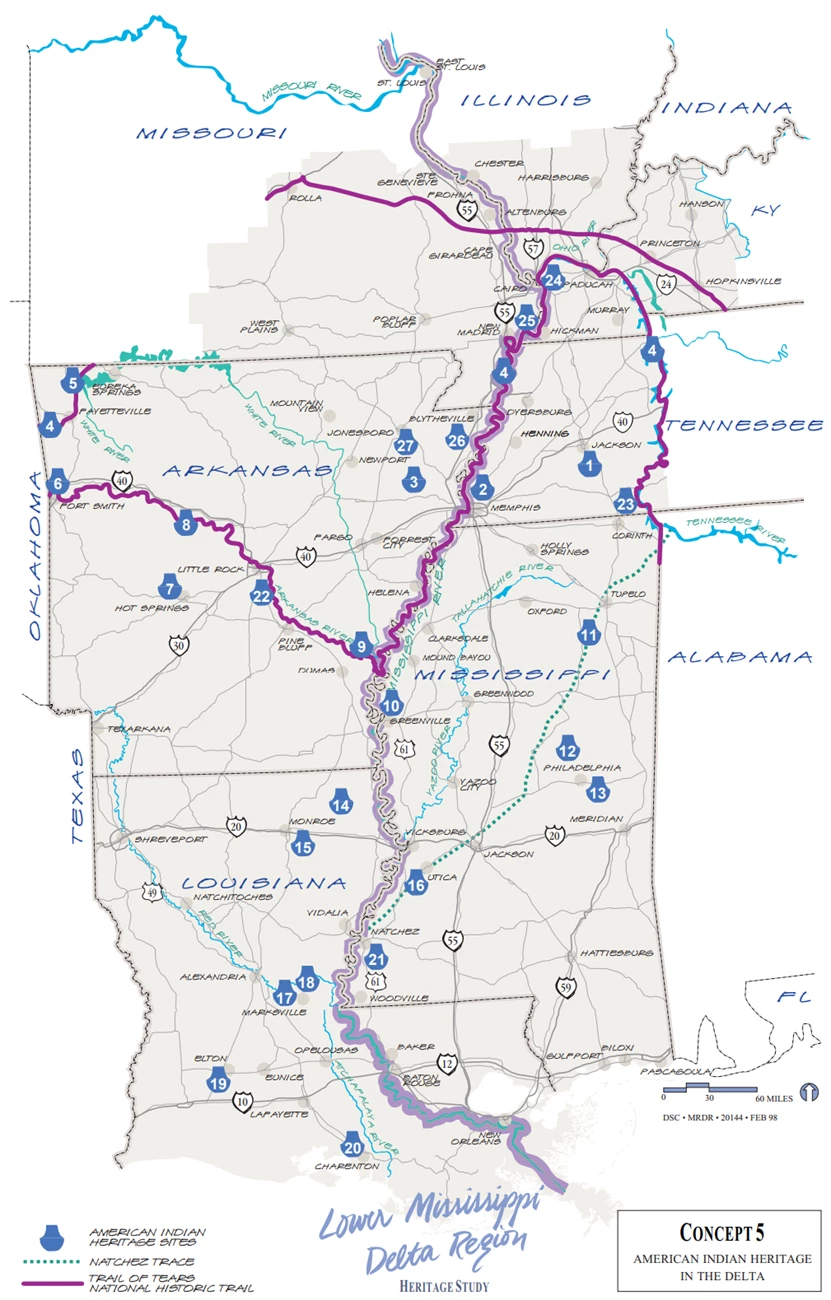GOAL
The goal of this concept is to begin to identify the stories and resources related to American Indian heritage in the Delta. Section 1104 of the Delta Initiatives calls for recommendations for establishing a Native American heritage corridor and cultural centering the Delta. This concept lays some of the groundwork toward implementing section 1104. The planning team met with Indian groups resident in the Delta and with some of those who have historic ties. Any further planning efforts to finalize section 1104 should include participation by Indian groups interested in the area.
IMPORTANCE/SIGNIFICANCE
Five thousand years ago the predecessors of today’s American Indians established communities in the Lower Mississippi Delta Region marked by large elaborate earthen mound structures. Around 1,000 A.D., larger, more complex mounds were erected by Mississippian cultures. Circular and conical mounds of the earliest inhabitants and the flat top earthen mounds within large towns of the Mississippian peoples are still evident across the lower Mississippi valley. The story of these inhabitants and the myriad generations of Native American peoples that followed helped define the natural and cultural landscape of a region and shaped the evolution of the character of a nation.
Today there are five federally recognized American Indian tribes resident within the Lower Mississippi Delta Region study area:
- Mississippi Band of Choctaw Indians (Philadelphia, Mississippi)
- lena Band of Choctaw (lena, Louisiana)
- Tunica-Biloxi Indians of Louisiana (Marksville, Louisiana)
- Chitimacha Tribe (Charenton, Louisiana)
- Coushatta Tribe (Elton, Louisiana).
Other Louisiana Indian groups are recognized by the state as Indian communities.
One of the misconceptions about American Indians in the Southeast is the belief that there are no Indian peoples still living in the Delta region or anywhere in the southeastern United States. On the contrary, tribal members from various tribes live in the Delta and are currently thriving. For example the Mississippi Band of Choctaw Indians in Philadelphia, Mississippi, which are descendants of Choctaws removed from their homelands in eastern Mississippi in the 1830s, struggled to survive as a recognized tribal entity. Today, they serve as a model for tribal organization, social programs, and successful economic development and diversity.
The Tunica-Biloxi Indians of Louisiana in Marksville have a different story of Indian survival to tell in the Delta. The Tunica-Biloxi, descendants of two separate tribes, the Tunica and Biloxi, received federal recognition in 1981. The tribe’s successful 10-year legal battle to recover its ancestral artifacts, the "Tunica Treasures," laid the foundation for the Native American Graves Protection and Repatriation Act, passed into law in 1995. This landmark ease and its preceding legislation have had an impact on other indigenous groups across the country in reclaiming their ancestral remains and artifacts.
The other federally recognized tribes in the Delta have stories of survival and success to relate. Their heritages reach back to the original mound building societies of various archeologic periods and stretch to the visible activities of today’s modern Indian peoples.

- Pinson Mounds State Archeological Site (Pinson, Tennessee)
- Chucalissa Indian Village (Memphis, Tennessee)
- Parkin Archeological State Park (Parkin, Arkansas)
- Trail of Tears National Historic Trail (Tennessee, Kentucky, Missouri, Arkansas, Mississippi)
- Pea Ridge National Military Park (Pea Ridge, Arkansas)
- Fort Smith National Historic Site (Fort Smith, Arkansas)
- Hot Springs National Park (Hot Springs, Arkansas)
- Trail of Tears National Historic Trail, Arkansas River Route
- Arkansas Post National Memorial, Menard/Hodges Archeological Site (Gillett, Arkansas)
- Winterville Mounds State Park and Museum (Washington County, Mississippi)
- Natchez Trace Parkway (Mississippi)
- Nanih Waiya Historical Memorial (Winston County, Mississippi)
- Mississippi Band of Choctaw Indians (Philadelphia, Mississippi)
- Poverty Point National Monument State Commemorative Area (Epps, Louisiana)
- Jena Band of Choctaw (Jena, Louisiana)
- Natchez Trace Parkway (Mississippi)
- Tunica-Biloxi Indiana of Louisiana (Marksville, Louisiana)
- Marksville State Commemorative Area (Marksville, Louisiana)
- Coushatta Tribe (Elton, Louisiana)
- The Chitimacha Tribe (Charenton, Louisiana)
- Grand Village of the Natchez (Natchez, Mississippi)
- Toltec (Knapp) Mounds Archeological State Park (Scott, Arkansas)
- Shiloh Mounds at Shiloh National Military Park (Shiloh, Tennessee)
- Wickliffe Mounds (Wickliffe, Kentucky)
- Towosahgy State Park (near East Prairie, Missouri)
- Hampson Museum State Park (Wilson, Arkansas)
- Arkansas State University Museum (Jonesboro, Arkansas)
Last updated: November 16, 2017
